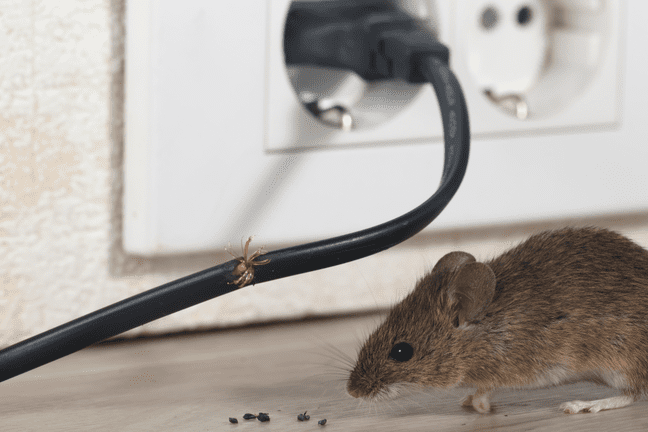

If you’ve noticed evidence of a rodent infestation in your home, you have a significant problem. Often, rats and mice create severe property damage before homeowners even detect them. These pests chew through everything, from wood to concrete, increasing fire risk and compromising the structural integrity of your home. Also, rodents carry more than 30 diseases, including Hantavirus and bubonic plague. Their waste, hair, and saliva contaminate your house and put your family at risk.
Signs of a Rodent Problem
You’ll usually notice signs of mice or rats in your kitchen. Look for damaged cardboard or plastic packaging, which often appears alongside telltale scattered crumbs. Homeowners may also notice rodent droppings near the food, which look like small black pellets about a quarter-inch long for mice. A black light can detect urine deposits from mice and rats. If you’re not paying attention, you can often brush these signs aside. Stay vigilant and inspect your kitchen every few weeks for signs of pests.
Also, look around your home. Holes may appear around appliances, doors, and windows. A mouse can enter through an opening less than a quarter-inch in diameter, while a rat can squeeze through a 1-inch hole. Sounds such as scratching or scuffling behind appliances, furniture, and walls can also indicate the presence of rodents. Your family dog or cat might be the first to notice these subtle noises.
Preventing Rodent Infestation
Removing food and water sources for rats and mice can prevent them from entering your home. If you live in a neighborhood with citrus and fruit trees, you may be susceptible to roof rats. Mice eat human food indiscriminately. The little quadruped’s diet naturally consists of grains and fruit, but they will eat anything that comes across their path. They’re scavengers and survivors, so they’ll find a way to live off any sustenance.
Don’t forget to remove pet food that is sitting out in the kitchen, because the smell will entice pests. Mice and rats are attracted to the scent of hamster and rabbit food, so keep an eye out if you’re domesticated buddy has a rodent-like diet. Dog and cat food will still satiate them, so it a good idea to keep Fido’s food in the fridge until he’s ready for it.
These small creatures are very social and smart and will figure out how to work as a team to gain access to your pantry. Seal off openings in the home so rodents can’t enter. In addition to small cracks around doors, windows, and appliances, these pests tend to take advantage of exterior points of entry like chimneys and vents.
Ridding Your Home of Rodents
If you only have one of these beasties running around, getting rid of it won’t be too difficult. If, however, you already have an infestation, you will have to call in a professional. When there are families of rodents living in the walls, DIY methods end up more expensive and not nearly as effective. You may kill most of the population, but whatever is left will keep growing, and in a few months, you’ll have to start over again.
The best thing to do is to call in a professional exterminator and do what you can to prep for the extermination. Extermination services are better at recognizing the signs of pest infestations and will even single out exactly where they live. Extermination will take a day at best and won’t fill your home with a terrible smell. Many pest control companies have pet-friendly poisons, so your kids and animal friends stay safe. Contact us today at (347) 305-8524 to rid your personal space from pesky rodents.
